A Panel of Professors, Visitors, and Graduate Students will answer questions about...
Research in Mathematics
Tuesday, November 19, 2013, 5:00pm
Ungar Room 402
Pizza will be served.
This meeting is intended for anyone with an interest in mathematics.
Please join us!
Research in Mathematics: What is it? How does one do it? How does one become a math researcher? etc.
Drew Armstrong will talk about...
Bad Mathematics
Tuesday, October 1, 2013, 5:00pm
Ungar Room 402
Pizza will be served.
This meeting is intended for anyone with an interest in mathematics.
Please join us!
We will share some of our favorite proofs of false theorems such that 0=1 and "all horses have the same color". We will also discuss seemingly correct proofs applied to non-mathematical situations, for humorous effect. (For example, I will prove that there are no uninteresting numbers.)
If you know any good "bad math", please come and share it with us.
We will watch some videos about...
Hexaflexagons
Tuesday, September 17, 2013, 5:00pm
Ungar Room 402
Pizza will be served.
This meeting is intended for anyone with an interest in mathematics.
Please join us!
After some videos, we will attempt to build our own. We will need scissors, paper, tape, and markers, so please bring some if you have them.
Drew Armstrong will perform a card trick based on a...
De Bruijn Sequence
Wednesday, April 10, 2013, 5:30 pm
Ungar Room 402
Pizza will be served.
This meeting is intended for anyone with an interest in mathematics.
Please join us!
I will perform a card trick and then teach everyone how to do it. I learned this trick from Persi Diaconis about ten years ago when he came to speak at Cornell University. I'm sure it's in his book.
The trick depends on the mathematical concept of a "De Bruijn sequence". See you there!
Ken Baker will give a tutorial on...
Making 3D Models of Mathematical Objects
Wednesday, March 6, 2013, 5:15 pm
Ungar Room 402
Pizza will be served.
This meeting is intended for anyone with an interest in mathematics.
Please join us!
I will give a tutorial on making 3D models of mathematical objects using SketchUp that are suitable for 3D printing through Shapeways.
You are strongly encouraged to bring a laptop with SketchUp installed, which you can download for free!
We will focus on a simple example based on the tetrahedron, but come with other ideas of mathematical structures you'd like realize and we'll see what we can do.
After the explanation, we will practice the skill.
Our friend Christopher Lloyd will teach us how to...
Cheat at Blackjack (Using Mathematics!)
Wednesday, February 6, 2013, 5:30pm
Ungar Room 402
Pizza will be served.
This meeting is intended for anyone with an interest in mathematics.
Please join us!
After the explanation, we will practice the skill.
Dr. Max Warshauer tells us about...
Problem Solving Techniques Using Mass Point Geometry
Thursday, April 19, 2012, 5:00pm
Ungar Room 402
Pizza will be served.
This talk is intended for anyone with an interest in mathematics.
Please join us!
Mass point geometry blends basic algebra, geometry, and physics into a powerful problem solving tool. We will discuss the basic ideas of mass point geometry and how to solve problems using it. Together we will work through a collection of problems including ones that have appeared in tests that we gave to identify a team that we send to the Primary Math World Contest in Hong Kong.
Drew Armstrong will talk about...
How Many Bridges?
Wednesday, February 8, 2012, 5:00pm
Ungar Room 402
Pizza will be served.
This talk is intended for anyone with an interest in mathematics.
Please join us!
I've been hired to construct freeways connecting n cities, without intersections. Q: How many bridges will I need to build? (I care because bridges are expensive.) A: It depends on what you mean by "bridge".
For simple bridges the answer is probably

but nobody knows how to prove this. For very fancy bridges I know how to prove that the answer is

Dr. Pengzi Miao establishes...
Basic Estimates of Surface Capacity
Thursday, November 10, 2011, 5:00pm
Ungar Room 402
Pizza will be served.
This talk is intended for anyone with an interest in mathematics.
Please join us!
Given a closed surface in R3, besides the usual geometric quantities like its area and the volume it encloses, one can consider the capacity associated to the surface. Physically speaking, if one thinks the surface as an ideal conductor, its capacity represents the amount of the electric charge which, in electrostatic equilibrium, raises the constant potential of the surface to unity.
In this talk, we discuss various inequalities giving upper and lower bounds of the surface capacity in terms of the surface area, the total mean curvature of the surface, and the volume enclosed by the surface. Most of these estimates can be derived using triple integral and surface integral one learns in Calculus III.
Rafael González D'León tells us about...
Generatingfunctionology
(Or looking for a closed formula for the Fibonnacci sequence)
Thursday, October 20, 2011, 5:00pm
Ungar Room 402
Pizza will be served.
This talk is intended for anyone with an interest in mathematics.
Please join us!
A beautiful formula for the integer sequence of Fibonacci numbers, already known by Abraham de Moivre in the 17th century, will give us enough motivation to introduce a technique very useful in Combinatorics to find closed formulas for sequences defined by a recurrence relation.
Dr. Ken Baker will be....
Coloring Knots
Thursday, September 8, 2011, 5:00pm
Ungar Room 402
Pizza will be served.
This talk is intended for anyone with an interest in mathematics.
Please join us!
Take a string. Tie an overhand knot. Connect the ends. Now you have a knotted loop.
Take another string. Tie a figure 8 knot. Connect the ends. Now you have another knotted loop.
Are these the same? That is, without cutting can you rearrange one to look exactly like the other? If you can't, maybe someone else can. Or not. How can you tell? Colors, that's how.
Gabriel Kerr will tell us about...
Our Non-Commutative Universe
Wednesday, April 6, 2011, 5:00pm
Ungar Room 402
Pizza will be served.
This talk is intended for anyone with an interest in mathematics.
Please join us!
Prior to the 1600s, geometry and number were disconnected. Then in 1637, Descartes invented coordinate geometry and over the next 300 years a completely new relationship between algebra, geometry and physics emerged. For every physical system there is a phase space geometry, which has its own algebra of functions. Life was good because the algebra was commutative ... but then came Heisenberg.
In this talk I will explain how the uncertainty principle is connected to non-commutativity of phase geometry. I will discuss how non-commutative geometry has evolved into a new subject which lies at the intersection of mathematics and physics.
To some mathematicians, the transition from commutative to non-commutative geometry represents a change in perspective as substantial as Descartes' revolution. Others, however, remain uncertain...
Dr. Patrick Bibby will tell us about...
Non-Cantorian Set Theory
Wednesday, March 2, 2011, 5:00pm
Ungar Room 402
Pizza will be served.
This talk is intended for anyone with an interest in mathematics.
Please join us!
The (fairly recent) transition from Cantorian set theory to non-Cantorian set theory will be compared to the (much older) transition from Euclidean to non-Euclidean geometry. You will see that non-Cantorian set theory is not quite as non-Cantorian as non-Euclidean geometry is non-Euclidean.
The cardinality of any finite set is simply the number of elements in the set. Emphasis will be placed on infinite sets and their cardinalities (transfinite numbers). What sets are equivalent to, i.e., have the same cardinality as, the set of natural numbers? What sets are in a sense bigger than the set of natural numbers? For example, does the set of real numbers have a larger cardinality that the set of natural numbers, and, if so, is there a set whose cardinality lies strictly between the cardinalities of these two sets? Maybe the Cantor set?
Be there to find out.
Dr. Drew Armstrong will say...
What are Bernoulli Numbers?
Wednesday, February 2, 2011, 5:00pm
Ungar Room 402
Pizza will be served.
This talk is intended for anyone with an interest in mathematics.
Please join us!
We have seen the formulas:
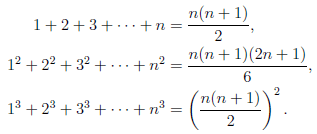
But is there a pattern to this? Fermat called it "the most beautiful problem of all arithmetic". Jakob Bernoulli was pretty jazzed when he figured it out: "...it took me less than half of a quarter of an hour to find that the tenth powers of the first 1000 numbers being added together will yield the sum 91,409,924,241,424,243,424,241,924,242,500." I will show you what the fuss is about.
Professor Ken Baker will talk about...
Coloring Knots
Wednesday, November 17, 2010, 5:00pm
Ungar Room 402
Pizza will be served.
This talk is intended for anyone with an interest in mathematics.
Please join us!
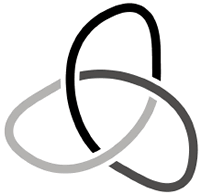
Loops may be knotted up in different ways.
But how can you tell that two knots are different?
We'll show a scheme for "coloring" pictures of knots that can distinguish them.
Mathematical artist Lun-Yi Tsai will talk about...
Math & Art: Into Higher Dimensions
Wednesday, October 6, 2010, 5:00pm
Ungar Room 402
Pizza will be served.
This talk is intended for anyone with an interest in mathematics.
Please join us!
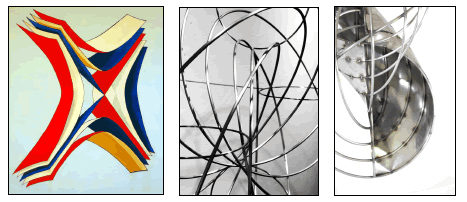
Majoring in math has given Lun-Yi a lifetime's worth of inspiration to make art. In this talk he'll focus on his recent transition from painting to sculpture.
"All of Tsai's work attempts to convey in a visually appealing and non-technical fashion the joy mathematicians derive from the act of doing mathematics."
-Bulletin of the American Mathematical Society, October 2010, p. 696
Professor Drew Armstrong will talk about...
Google and Ping-Pong
Wednesday, September 1, 2010, 5:00pm
Ungar Room 402
Pizza will be served.
This talk is intended for anyone with an interest in mathematics.
Please join us!
I invited friends A,B,C to my house for a ping-pong tournament, and here are the results:
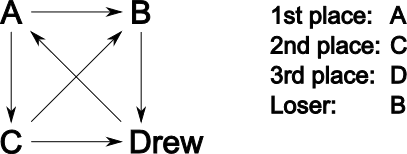
How did I rank the players? I'll tell you Wednesday. Hint: It's the same way Google ranks webpages.
Dr. Eric Harper will talk about...
Cohomology
Tuesday, April 27, 2010, 5:00pm
Ungar Room 402
Pizza will be served.
This talk is intended for anyone with an interest in mathematics.
Please join us!
"The de Rham complex may be viewed as a God-given set of differential equations, whose solutions are the closed forms." --- Raoul Bott and Loring W. Tu.
Do the words "de Rham complex" scare you? Does the word "cohomology" scare you? Have you ever wondered what a God-given set of differential equations looks like?
Now is your chance!
Dr. Drew Armstrong will talk about...
Buffon's Noodle
Monday, March 8, 2010, 5:00pm
Ungar Room 402
Pizza will be served.
This talk is intended for anyone with an interest in mathematics.
Please join us!
Georges-Louis Leclerc (1707-1788) had an interest in gambling. He analyzed various games of chance using geometric reasoning, and in the process invented the subject of "geometric probability".
Here is his gem: You have a needle of length l and a hardwood floor with boards of width d. You throw the needle on the floor. What is the chance that it doesn't land on a crack?
I'm not going to tell you now. You have to come and see.
Dr. Chaitanya Guttikar will talk about...
Recovering Geometry from Algebra -
A Genius Idea of Grothendieck
Friday, February 5, 2010, 5:00pm
Ungar Room 402
Pizza will be served.
This talk is intended for anyone with an interest in mathematics.
Please join us!
In the 1960s Alexander Grothendieck revolutioned algebraic geometry by means of a very elementary observation - that the continuous functions on a set (circle, sphere, interval [0,1], etc) tell us everything we need to know about the shape of the set. We will see how this is possible, and towards the end, if time permits, we will learn how this simple observation completely changed the point of view of studying shapes.
Dr. Ken Baker will talk about...
Curves on a Klein Bottle
Thursday, October 22, 2009, 5:00pm
Ungar Room 402
Pizza will be served.
This talk is intended for anyone with an interest in mathematics.
Please join us!
How many different curves are on a sphere? on a torus? on a Mobius band? on a Klein bottle?
Three. No, that can't be right. Or can it?
What do you mean by different anyways?
And for that matter, what are you calling a curve?
We'll examine the "small" surfaces from the topological perspective and try to get a handle on the number of simple closed curves on them.
Dr. Drew Armstrong will talk about...
What is Information?
Thursday, September 17, 2009, 5:00pm
Ungar Room 402
Pizza will be served.
This talk is intended for anyone with an interest in mathematics.
Please join us!
I just flipped a coin. How much would you pay me to know the outcome? One dollar? How much would you pay me to know the outcome of seven coin flips? $2.81? These are not just academic questions. Being able to give a precise value to information is vital in our age of communication.
Evry Englsh msg cntns sm rdndncy, doesn't it? If I give you a text file written in English, by how much could you compress it? In 1948 a Bell Labs researcher named Claude Shannon gave beautiful and precise answers to these questions. It turns out you can *easily* compress an English text file by a factor of 2. If you're infinitely smart, you might approach a factor of 8!



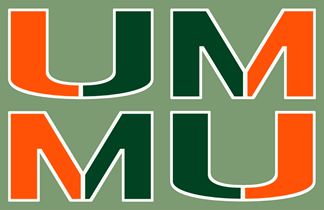 The Math Department hosts the University of Miami Mathematics Union (UMMU) – a club for undergrads, grad students, and even faculty, to promote the enjoyment of mathematics. We hope to give students the chance to get to know each other, and to get to know some faculty.
The Math Department hosts the University of Miami Mathematics Union (UMMU) – a club for undergrads, grad students, and even faculty, to promote the enjoyment of mathematics. We hope to give students the chance to get to know each other, and to get to know some faculty.





